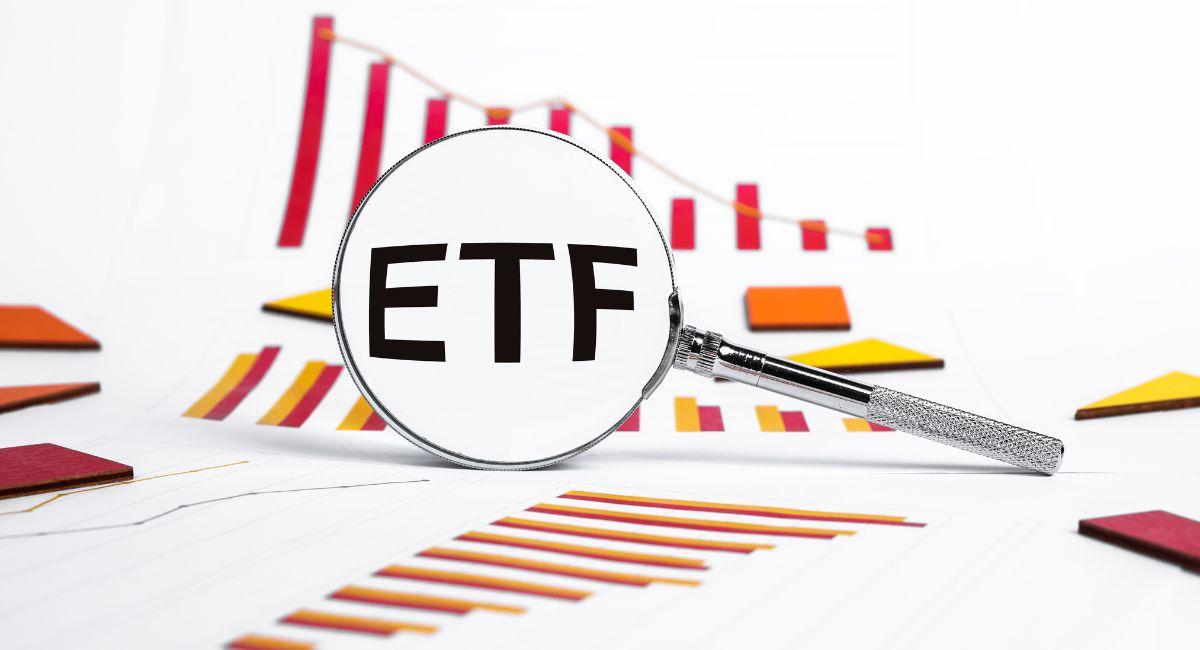Understanding The Important Top 10 Difference Between Blockchain ETFs And Bitcoin ETFs
As the world of cryptocurrency and blockchain technology continues to evolve, investors are presented with an array of investment options. Among these, exchange-traded Funds (ETFs) have gained prominence, providing a convenient way for investors to gain exposure to the blockchain and cryptocurrency markets. In this article, we explore the fundamental distinctions between Blockchain ETFs and Bitcoin ETFs, shedding light on their unique characteristics and investment implications.
Understanding Blockchain ETFs

Blockchain ETFs, or Exchange-Traded Funds, are investment funds that track the performance of companies involved in the development and implementation of blockchain technology. These funds offer investors diversified exposure to the broader blockchain ecosystem, encompassing companies across various sectors such as technology, finance, healthcare, and more.
Key Components of Blockchain ETFs
- Diverse Portfolio: Blockchain ETFs typically include a diverse set of stocks from companies engaged in blockchain-related activities. This diversification aims to spread risk across multiple sectors rather than concentrating it in a specific cryptocurrency or technology.
- Risk Exposure: Investing in a Blockchain ETF provides investors with exposure to the potential growth of the entire blockchain industry, not just the performance of individual cryptocurrencies. This can be particularly appealing to those seeking exposure to blockchain without the volatility associated with specific digital assets.
- Technology Adoption: Blockchain ETFs often focus on companies that are early adopters or integrators of blockchain technology into their business models. This includes companies utilizing blockchain for supply chain management, financial transactions, and various other applications.
Bitcoin ETFs: A Focus on Digital Gold

Bitcoin ETFs, on the other hand, are designed to track the price movements of Bitcoin, the pioneering and most widely recognized cryptocurrency. These funds allow investors to gain exposure to the price of Bitcoin without actually owning the digital asset. Bitcoin ETFs have garnered significant attention due to Bitcoin’s status as a store of value and a potential hedge against traditional financial market volatility.
Key Components of Bitcoin ETFs
- Sole Focus on Bitcoin: Bitcoin ETFs concentrate solely on tracking the price of Bitcoin. This focused approach appeals to investors who specifically want exposure to the world’s first and most well-known cryptocurrency.
- Store of Value Narrative: Bitcoin is often referred to as “digital gold” due to its limited supply and its potential role as a store of value. Bitcoin ETFs allow investors to participate in this narrative without having to navigate the complexities of owning and securing actual Bitcoin.
- Cryptocurrency Market Exposure: While Bitcoin ETFs don’t provide exposure to the broader blockchain ecosystem, they do expose investors to the dynamics of the cryptocurrency market. Factors influencing the price of Bitcoin, such as market sentiment, regulatory developments, and macroeconomic trends, can impact the performance of Bitcoin ETFs.

Also, read- Unraveling The Reasons For Rise In Valuation Of Crypto Stocks Due To Bitcoin ETFs
Considerations for Investors

- Risk Tolerance and Investment Objectives:
- Blockchain ETFs: Investors with a higher risk tolerance seeking diversification across various industries and applications of blockchain technology may find these ETFs appealing. The focus is on the growth potential of the broader blockchain ecosystem.
- Bitcoin ETFs: Investors with a specific interest in cryptocurrencies and a higher risk tolerance may choose Bitcoin ETFs. These funds are more concentrated, providing exposure to the potential price appreciation of Bitcoin.
- Market Dynamics:
- Blockchain ETFs: Understanding the regulatory landscape and technological developments in the broader blockchain industry is crucial. Regulatory changes, partnerships, and advancements in blockchain adoption can impact the performance of these ETFs.
- Bitcoin ETFs: The value of Bitcoin is influenced by factors like regulatory decisions, macroeconomic trends, and institutional adoption. Investors in Bitcoin ETFs should closely monitor events affecting the cryptocurrency market.
- Long-Term vs. Short-Term Horizon:
- Blockchain ETFs: Suited for investors with a long-term horizon, these funds capitalize on the potential growth and transformative impact of blockchain technology across various sectors. Patience is key for investors expecting long-term returns.
- Bitcoin ETFs: Investors with a shorter-term horizon or those seeking to capitalize on Bitcoin’s price volatility may find Bitcoin ETFs more suitable. However, short-term gains come with higher volatility and increased risk.
- Diversification:
- Blockchain ETFs: Offer diversified exposure to companies involved in blockchain development, reducing reliance on the performance of a single cryptocurrency. This can mitigate risk compared to investing solely in individual digital assets.
- Bitcoin ETFs: Lack the diversification seen in Blockchain ETFs, as they are directly tied to the price movements of Bitcoin. Investors should be prepared for the higher volatility associated with a more concentrated investment.
- Regulatory Environment:
- Blockchain ETFs: Investors should be aware of the regulatory environment affecting the companies in the ETF portfolio. Regulatory clarity and supportive frameworks can positively impact the performance of these funds.
- Bitcoin ETFs: Regulatory developments specific to cryptocurrencies can significantly influence the performance of Bitcoin ETFs. Regulatory scrutiny, acceptance, or rejection of Bitcoin-related financial instruments can impact investor sentiment.
- Technological Advancements:
- Blockchain ETFs: The performance of these funds is influenced by advancements in blockchain technology. Investors should stay informed about developments such as upgrades to consensus algorithms, interoperability solutions, and enterprise adoption of blockchain.
- Bitcoin ETFs: Technological developments related to the Bitcoin network, such as scalability solutions and upgrades, can impact the cryptocurrency’s performance. Staying informed about the evolving technological landscape is crucial for investors.
- Market Sentiment:
- Blockchain ETFs: Influenced by overall market sentiment toward blockchain technology, partnerships, and adoption rates across industries.
- Bitcoin ETFs: Subject to market sentiment specific to the cryptocurrency space, including factors like institutional interest, macroeconomic trends, and public perception of Bitcoin.
- Management Fees and Costs:
- Blockchain ETFs: Investors should consider management fees associated with these funds, which cover the costs of portfolio management and administration.
- Bitcoin ETFs: Similar to Blockchain ETFs, investors should assess the management fees and costs associated with Bitcoin ETFs. Cost considerations are crucial for optimizing returns.
- Historical Performance:
- Blockchain ETFs: Investors should analyze the historical performance of the ETF, considering factors such as past returns, volatility, and responsiveness to market conditions.
- Bitcoin ETFs: Historical performance data for Bitcoin ETFs is essential for understanding how the fund has reacted to various market conditions and whether it aligns with the investor’s risk-return profile.
- Educational Resources and Research:
- Blockchain ETFs: Access to educational resources and in-depth research on the companies within the ETF portfolio is valuable for informed decision-making.
- Bitcoin ETFs: Investors should leverage educational resources to understand the dynamics of the cryptocurrency market, the factors influencing Bitcoin’s price, and the potential risks and rewards.
In summary, investors should conduct thorough due diligence and consider their individual risk tolerance, investment objectives, and time horizon when choosing between Blockchain ETFs and Bitcoin ETFs. Each type of ETF offers distinct exposure and aligns with specific investment strategies, making it essential for investors to align their choices with their financial goals and preferences. The rapidly evolving nature of both blockchain technology and cryptocurrencies necessitates ongoing research and adaptability in the investment approach.
$DETF is revolutionizing finance by bringing Exchange-Traded Funds (ETFs) onto the blockchain, shaping the future of finance. @detf_official
We look forward to seeing this manifest! #RWA #ETF #BTC pic.twitter.com/BVjIvjIdZm
— Real World Asset Watchlist (@RWAwatchlist_) January 4, 2024
Conclusion: Crafting a Diversified Crypto Portfolio
In conclusion, the decision to include either Blockchain ETFs or Bitcoin ETFs in a crypto portfolio is a nuanced process that requires careful consideration of various factors. Investors must weigh their preferences, risk tolerance, and overarching investment goals to make a strategic choice. Both types of ETFs contribute unique elements to a diversified investment portfolio, providing exposure to the ever-evolving landscape of blockchain technology and the distinctive attributes of Bitcoin as a digital asset. As the cryptocurrency market continues to mature, investors can anticipate an expanding array of investment products, each tailored to address different facets of this dynamic and transformative industry.
**1. Investor Preferences:
- Blockchain ETFs: Suited for those who are intrigued by the transformative potential of blockchain technology and wish to diversify across various sectors beyond cryptocurrencies. Investors with a long-term vision and an interest in technological innovation may find these ETFs align with their preferences.
- Bitcoin ETFs: Attractive to investors who specifically seek exposure to the potential price appreciation of Bitcoin. Those who are drawn to the digital gold narrative, short-term trading opportunities, or the cryptocurrency’s role as a store of value may prefer Bitcoin ETFs.
**2. Risk Tolerance:
- Blockchain ETFs: Generally exhibit lower volatility compared to direct cryptocurrency investments, providing a more stable option for investors with a moderate risk tolerance. The diversified nature of these funds can help mitigate risks associated with the performance of individual assets.
- Bitcoin ETFs: Tend to be more volatile due to their direct correlation with the price movements of Bitcoin. Investors with a higher risk tolerance, who are comfortable with the potential for significant price fluctuations, may find Bitcoin ETFs suitable.
**3. Investment Goals:
- Blockchain ETFs: Aligned with investment goals focused on long-term growth, technological innovation, and exposure to various applications of blockchain across industries. Investors seeking a diversified approach to the broader blockchain ecosystem may choose these funds.
- Bitcoin ETFs: Suited for those whose investment goals center on capitalizing on the potential short-to-medium-term gains associated with Bitcoin’s price movements. Investors with a specific interest in the cryptocurrency’s market dynamics and potential as a digital store of value may opt for Bitcoin ETFs.
**4. Diversification:
- Blockchain ETFs: Provide a diversified exposure to companies involved in blockchain technology, reducing reliance on the performance of a single cryptocurrency. This diversification can be appealing for risk-conscious investors.
- Bitcoin ETFs: Lack the diversification seen in Blockchain ETFs, as they are directly tied to the price movements of Bitcoin. Investors should be prepared for the higher volatility associated with a more concentrated investment.
**5. Market Evolution:
- Blockchain ETFs: Reflect the evolution and growth potential of the broader blockchain industry. Investors interested in being part of the transformative journey of blockchain technology across various sectors may opt for these funds.
- Bitcoin ETFs: Provide exposure to the maturation of the cryptocurrency market, tracking the developments specific to Bitcoin. Investors anticipating the continued acceptance and integration of Bitcoin within the financial landscape may choose Bitcoin ETFs.
**6. Flexibility and Adaptability:
- Blockchain ETFs: Offer flexibility by encompassing a diverse range of companies engaged in blockchain development. The adaptability of these funds allows investors to participate in the growth of various blockchain applications.
- Bitcoin ETFs: Provide a more specialized exposure to the cryptocurrency market, catering to investors who specifically seek opportunities tied to Bitcoin’s unique characteristics. The focus on a single asset offers a straightforward investment approach.
**7. Educational Considerations:
- Blockchain ETFs: Investors considering these funds may benefit from understanding the applications and potential impact of blockchain technology across industries. In-depth knowledge of the companies within the ETF portfolio enhances informed decision-making.
- Bitcoin ETFs: Investors in Bitcoin ETFs should leverage educational resources to understand the dynamics of the cryptocurrency market, the factors influencing Bitcoin’s price, and the potential risks and rewards associated with investing in digital assets.
**8. Monitoring and Research:
- Blockchain ETFs: Require ongoing monitoring of developments in the broader blockchain industry, including technological advancements, regulatory changes, and partnerships. Staying informed about the companies within the ETF portfolio is essential.
- Bitcoin ETFs: Investors should stay abreast of cryptocurrency market dynamics, regulatory decisions impacting Bitcoin, and macroeconomic trends influencing the digital asset. Regular research is crucial for understanding the unique factors affecting Bitcoin’s performance.
As the cryptocurrency market continues to evolve, investors should recognize that both Blockchain ETFs and Bitcoin ETFs have roles to play in a diversified investment strategy. The dynamic and transformative nature of the crypto industry ensures that an expanding array of investment products will cater to different aspects of investor preferences, risk profiles, and long-term goals. Ultimately, the choice between Blockchain ETFs and Bitcoin ETFs should align with an investor’s broader financial strategy and vision for participating in the growth of the crypto ecosystem.
Stay informed with daily updates from Blockchain Magazine on Google News. Click here to follow us and mark as favorite: [Blockchain Magazine on Google News].
Get Blockchain Insights In Inbox
Stay ahead of the curve with expert analysis and market updates.
latest from tech
Disclaimer: Any post shared by a third-party agency are sponsored and Blockchain Magazine has no views on any such posts. The views and opinions expressed in this post are those of the clients and do not necessarily reflect the official policy or position of Blockchain Magazine. The information provided in this post is for informational purposes only and should not be considered as financial, investment, or professional advice. Blockchain Magazine does not endorse or promote any specific products, services, or companies mentioned in this posts. Readers are encouraged to conduct their own research and consult with a qualified professional before making any financial decisions. The featured image used is just a creative depiction of the title and it does not intend to hurt sentiments of any person or institution. If it hurts anyone sentiments, please do not hesitate to reach out to Blockchain Magazine.

 Bitcoin
Bitcoin  Ethereum
Ethereum  XRP
XRP  Tether
Tether  Solana
Solana  USDC
USDC  Dogecoin
Dogecoin  Cardano
Cardano  Lido Staked Ether
Lido Staked Ether  TRON
TRON  Wrapped Bitcoin
Wrapped Bitcoin  Chainlink
Chainlink  Wrapped stETH
Wrapped stETH  Avalanche
Avalanche  Sui
Sui  Stellar
Stellar  Litecoin
Litecoin  Toncoin
Toncoin  Shiba Inu
Shiba Inu  Hedera
Hedera  LEO Token
LEO Token  USDS
USDS  MANTRA
MANTRA  Hyperliquid
Hyperliquid  Polkadot
Polkadot  WETH
WETH  Bitcoin Cash
Bitcoin Cash  Bitget Token
Bitget Token  Ethena USDe
Ethena USDe  Wrapped eETH
Wrapped eETH  Uniswap
Uniswap  Monero
Monero  NEAR Protocol
NEAR Protocol  Pepe
Pepe  WhiteBIT Coin
WhiteBIT Coin  Aave
Aave  Ondo
Ondo  Bittensor
Bittensor  Aptos
Aptos  Internet Computer
Internet Computer  Dai
Dai  Official Trump
Official Trump  Ethereum Classic
Ethereum Classic  Mantle
Mantle  Tokenize Xchange
Tokenize Xchange  OKB
OKB  Gate
Gate  sUSDS
sUSDS  Coinbase Wrapped BTC
Coinbase Wrapped BTC 




